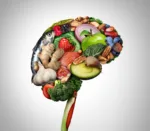
The connection between food and mental health is profound, with certain nutrients playing a pivotal role in supporting cognitive function and emotional well-being. In this blog post, we’ll explore the best foods for mental health, understand how food affects mental health and emphasize the crucial link between mental health and nutrition.
Best Foods for Mental Health
- Omega-3 Fatty Acids: Essential for brain health, omega-3 fatty acids — found in fatty fish like salmon as well as walnuts and flaxseeds — contribute to cognitive function and may help alleviate symptoms of depression and anxiety.
- Antioxidant-Rich Foods: Berries, dark chocolate and colorful fruits and vegetables are all rich in antioxidants. These compounds protect the brain from oxidative stress, potentially reducing the risk of mental decline.
- Whole Grains: Complex carbohydrates from whole grains like brown rice, quinoa and oats provide a steady release of energy. This helps maintain stable blood sugar levels, supporting mood and concentration.
- Protein-Rich Foods: Protein sources such as lean meats, dairy and legumes contain amino acids, essential for neurotransmitter synthesis. Balancing neurotransmitters is crucial for mood regulation and mental health.
- Leafy Greens: Spinach, kale and other leafy greens are rich in folate, a B-vitamin associated with a lower risk of depression. Folate plays a key role in neurotransmitter synthesis, promoting mental well-being.
How Food Affects Mental Health
Amino acids from protein-rich foods are the building blocks of neurotransmitters, including serotonin and dopamine. Proper neurotransmitter balance is necessary for mood stability and overall mental health. Consuming whole grains and complex carbohydrates helps regulate blood sugar levels. Fluctuations in blood sugar can impact mood and contribute to symptoms of anxiety and irritability.
The gut microbiome plays a significant role in mental health. Fermented foods like yogurt and kefir, rich in probiotics, support a healthy gut environment, potentially positively influencing mood and cognitive function. Antioxidant-rich foods combat inflammation, which has been linked to mental health disorders. A diet high in fruits, vegetables and omega-3 fatty acids helps mitigate inflammation in the brain.
Mental Health and Nutrition
Deficiencies in certain vitamins and minerals, such as B-vitamins, vitamin D and iron, have been associated with mental health disorders. A well-balanced diet ensures the body receives essential nutrients for optimal mental well-being. Highly processed and sugary foods have been linked to an increased risk of depression and anxiety. These foods may contribute to inflammation and disrupt the balance of gut bacteria, negatively affecting mental health.
Dehydration can impair cognitive function and mood. Staying adequately hydrated is a simple yet crucial aspect of supporting mental well-being. Nutritional needs vary from person to person. When developing personalized nutrition plans to support mental health, factors such as age, gender and underlying health conditions must be considered.
Get help today
The food we consume can have a profound impact on mental health. By incorporating a diverse range of nutrient-rich foods, individuals can support neurotransmitter balance, regulate blood sugar, reduce inflammation and foster a healthy gut-brain connection.
Recognizing the link between mental health and nutrition empowers individuals to make informed dietary choices that contribute to overall well-being. As we nourish our bodies, we also nourish our minds, fostering a harmonious balance essential for mental health.
If you or a loved one needs help for your mental health, reach out to our team at High Focus Center and get the help you need and deserve today.
Recent Posts
- How Mood Stabilizers Work to Restore Emotional Balance
- Trauma-Informed Approaches in Therapy: Why Understanding Trauma is Essential for Healing
- Using Art as a Voice: Exploring the Therapeutic Benefits of Creativity
- What is Xylazine?
- How Overcoming Roadblocks is Crucial to Recovery – And How Your Treatment Center Can Help




